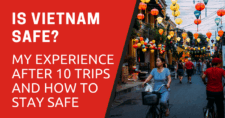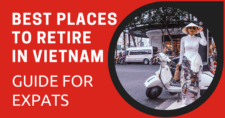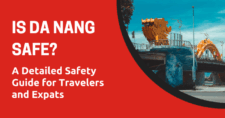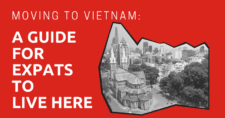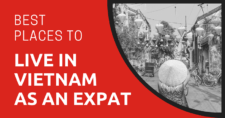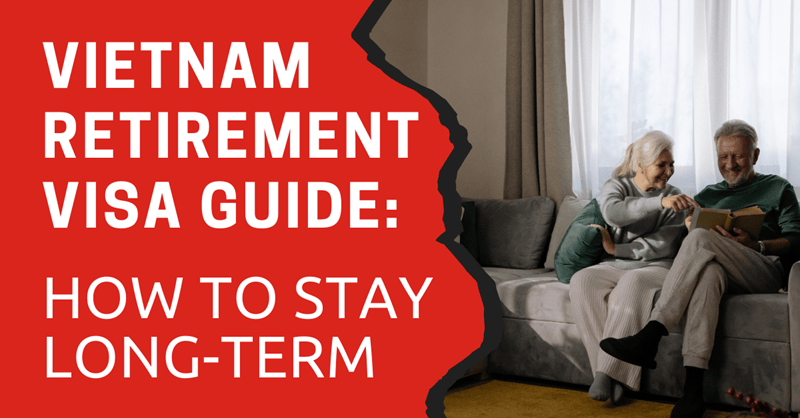
This article will take approximately 15 minutes to read. Don't have the time right now? No worries. Email the ad-free version of the article to yourself and read it later!
Planning to retire in Vietnam? Discover all visa and long-stay options for retirees, including e-visas, visa runs, family visas, and more.
Have you been thinking about retiring in Vietnam? You’re not alone.
Vietnam is quickly becoming a popular retirement destination. Over the last few years, the country has developed rapidly. Its infrastructure is improving, with modern roads, hospitals, and airports. At the same time, the cost of living remains low compared to many countries, even in Southeast Asia. This means you can enjoy a comfortable, relaxed lifestyle without spending a fortune.
Many retirees love the slower pace of life, fresh and affordable food, and Vietnam’s world-class coffee culture. It’s easy to see why more and more people are choosing to spend their retirement years here.
If you plan to retire in Vietnam, the first thing you need to think about is your visa. Vietnam doesn’t have a dedicated retirement visa like some other countries, but there are several ways to stay long-term. In this article, I’ll break down all of the visa options available for retirees, explain the requirements, and show you step-by-step how to apply.
Disclaimer: This article may include links to products or services offered by ExpatDen's partners, which give us commissions when you click on them. Although this may influence how they appear in the text, we only recommend solutions that we would use in your situation. Read more in our Advertising Disclosure.
Key Takeaways
- Visa is the biggest challenge for retirees in Vietnam since the country doesn’t have a dedicated retirement visa.
- Visa runs are the most popular option for retirees, as well as other expats living in Vietnam.
- You can do a visa run by land or air every 45 or 90 days, depending on your visa type.
- An e-visa is the most common choice. It allows you to stay in Vietnam for 90 days but requires 3 to 5 days of processing time.
- There’s also a same-day visa run available through visa agencies, which you can find in many big cities in Vietnam.
- There is news about a 10-year Golden Visa expected in 2025, which could become a great long-term option for retirees. The requirements are not yet known, and we will update this article as soon as more information is available.
Good to Know
The first thing you need to know is that, unfortunately, Vietnam doesn’t have a dedicated retirement visa like Thailand. This makes visas the biggest challenge for retirees who want to live here long-term.
Right now, most retirees stay in Vietnam by doing a visa run every 45 days to 90 days depending on their options and then renewing it regularly. It works, but it can be a hassle since you need to keep track of expiration dates and leave the country for a border run. I’ll explain this option in detail later in the article.
There’s also some exciting news about a possible 10-year Golden Visa expected to launch in 2025. If it becomes available, this could finally give retirees a stable, long-term visa option. You can read the official announcement here. For now, it’s a “wait and see” situation, but it’s definitely something to keep an eye on if you plan to move in Vietnam.
Visa Runs
As mentioned earlier, many retirees use visa runs to stay in Vietnam long-term. This simply means leaving the country before your visa expires and coming back with a new visa.
And this is not just for retirees. But for any expats who want to stay in Vietnam long-term.
Right now, visa runs in Vietnam are much more flexible compared to Thailand. There’s no official limit on how many times you can do it. Many retirees and long-term visitors have been living in Vietnam for years by repeatedly using this method.
However, visa rules can change quickly, so always stay up-to-date with the latest immigration policies to avoid surprises.
- Visa Exemption: For certain nationalities, you can exit Vietnam and re-enter immediately without applying for a visa. This option usually gives you around 45 days of stay, but the exact number of days depends on your nationality.
- 90-Day E-Visa: If you are from countries like the USA, UK, or Australia, you need to apply for an e-visa. It allows you to stay in Vietnam for 90 days. The application takes 3 to 5 business days to process, and you cannot apply for a new e-visa while inside Vietnam, so you must leave the country before starting a new application.
- Visa Agent (Emergency Visa): This is the most expensive option, but also the fastest. A visa agent can help you complete a visa run within the same day by handling all the paperwork and providing a last-minute visa approval. It’s ideal for retirees who want to avoid waiting several days outside Vietnam while their new visa is processed.
Let’s take a look at each option in more detail.
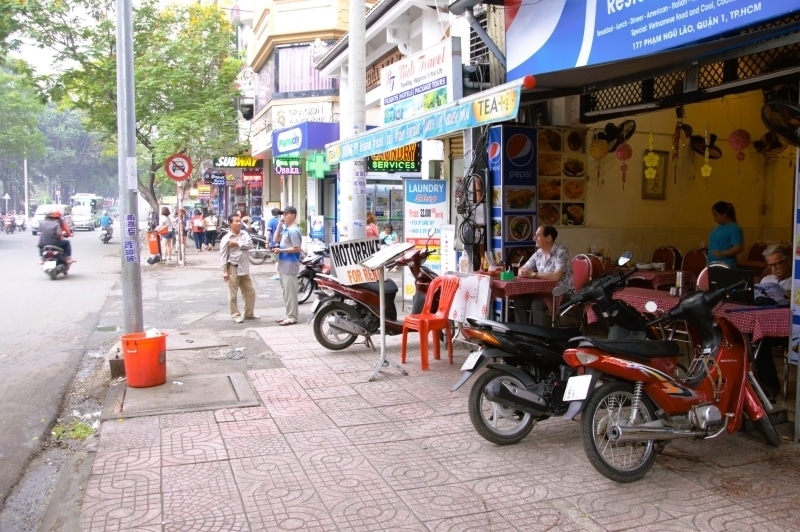
Visa Exemption
Unlike Thailand, not many nationalities can enter Vietnam without a visa. If you’re from countries like Germany, Spain, France, Italy, the Netherlands, and several others, you may qualify for a 45-day visa-free stay.
When your 45 days are up, you can leave Vietnam by bus or plane, then return and get another 45-day stay. This works similarly to a visa run, but without needing to apply for an e-visa beforehand.
You can check the full list of visa-exempt countries and their allowed stay durations on Wikipedia’s Vietnam visa policy page.
If you are lucky enough to have this privilege, it’s the easiest and cheapest way to stay in Vietnam long-term, though you still need to carefully track dates to avoid overstaying.
90-Day E-Visa
If you’re from a country that doesn’t qualify for visa exemption such as the US, UK, Australia, or Canada, or if you need to stay in Vietnam longer than the visa exemption period, the 90-day e-visa is your main option.
This visa lets you stay in Vietnam for up to 90 days. There are two types you can choose from:
- Single-entry visa: US$25. It becomes invalid once you leave Vietnam.
- Multiple-entry visa: US$50. You can leave and re-enter Vietnam as many times as you want during the 90-day period.
You must apply online through the official Vietnamese government website: https://evisa.gov.vn/. Be careful as there are many unofficial websites that charge extra fees or create confusion. Always use the official portal.
Once your visa is approved, you can enter Vietnam and activate it.
Important Notes
- The application process takes 3 to 5 business days, but delays are common, so apply early.
- You cannot apply for a new e-visa while inside Vietnam.
- When your 90 days are up, you must exit the country, apply for a new e-visa, and stay in another country until it’s approved
Application Tips
There are some application tips you should know.
- Entry and exit dates:
- Set your entry date one day before your planned arrival to give yourself flexibility if travel plans change.
- Choose an exit date that gives you the full 90 days, even if you plan to stay for a shorter period.
- Exact name match: Your name must match your passport exactly, including middle names. Even a small mismatch can cause problems when boarding.
- Duration of stay: Always select the full 90 days. If you choose fewer days, your visa will only be valid for that time.
- Port of entry: When applying, select one of the official entry points listed on the application, such as major airports, seaports, or land borders.
The 90-day e-visa is straightforward and affordable. The only challenge is visa processing time. So, you need to play your trip out of Vietnam well. Many retirees use this method while waiting for more permanent visa options to become available.
Emergency Visa Through an Agency (Same Day Visa Run)
Since the e-visa takes 3 to 5 business days to process and you can only apply after you leave Vietnam, many retirees use a visa agency to get a new 90-day visa on the same day.
These agencies can apply for what’s called an emergency visa on your behalf. This type of visa cannot be applied for directly and must go through an agent.
When you work with a visa agent, they will give you several time-frame options, such as 4 hours, 8 hours, 12 hours, or more. The faster you want your visa processed, the higher the cost will be.
Typical Process
- Contact the agent a few days before your visa expires.
- The agent will request documents like your passport, photos, and other personal details to start your application.
- They will arrange transportation for you to a nearby border, usually Laos or Cambodia.
- On the scheduled day, you exit Vietnam at the border and wait while the agent processes your emergency visa and get you a last-minute visa-on-arrival approval letter
- Once the agent confirms approval, you can walk back across the border and re-enter Vietnam with your new 90-day visa.
- If you prefer to do this by air travel, tell your agent in advance. This option is more expensive but can be more comfortable.
Visa Agency Cost
- Agent service fee: Around US$100 to US$200 depending on how fast you need the visa.
- Visa fee: US$25 for single entry or US$50 for multiple entry.
- Transportation cost: If you take a bus arranged by the agent, this is usually included in the total price, but confirm beforehand.
Overall, this is the most expensive visa run method, but it is also the most convenient, especially if you do not want to wait several days in another country while your e-visa is processed.
Recommended Agencies
Two visa agencies are popular among expats in Vietnam. Lynn Visa is one of the most well-known choices. Many retirees and long-term visitors use their services because they are experienced and efficient, although some people have mentioned that their prices have gone up recently.
Another option is My Vietnam Visa. While I haven’t personally used them, they seem reliable and provide a lot of useful visa advice and resources on their website, making them worth checking out if you’re exploring different agencies.
You can find many visa agents in large cities like Ho Chi Minh City, Hanoi, and Da Nang, making this a practical option if you live near these hubs. These are also why these cities are best places to retire in Vietnam too.
Other Options
In addition to doing regular visa runs, there are a few other ways to stay in Vietnam long-term. These options are only available to certain groups of people and usually come with very specific requirements.
You can apply for these visas from Vietnamese embassies or consulates abroad.
Have a Family in Vietnam
If you are married to a Vietnamese citizen or have a Vietnamese child, you can get a Temporary Residence Card (TRC). With it, you can stay in Vietnam for 3 years. After 3 years, you can keep renewing the visa.
Investment Visa
Vietnam also offers an investment visa, which can be obtained by either registering a company in Vietnam or investing in an existing business. However, the required investment amounts are quite high, making this option suitable only for a small group of people who truly plan to do business in Vietnam.
There are four main types of investment visas, from DT1 to DT4, each with different minimum investment requirements and visa validity. Below is a breakdown of the requirements with approximate US dollar equivalents (based on VND 25,000 = US$1):
| Visa Type | Investment Amount | Visa Validity | TRC Validity |
| DT1 | Over VND 100 billion (about US$4 million) | Up to 5 years | Up to 10 years |
| DT2 | VND 50–100 billion (about US$2–4 million) | Up to 5 years | Up to 10 years |
| DT3 | VND 3–50 billion (about US$120,000–2 million) | Up to 3 years | Up to 3 years |
| DT4 | Under VND 3 billion (about US$120,000) | Up to 1 year | Not eligible for TRC |
As you can see, the minimum required investment starts at US$120,000. Because of this, the investment visa is best suited for serious investors who understand the Vietnamese market and are willing to manage a business here.
It’s not a practical option for retirees who simply want a visa, as the financial and compliance requirements can be complex and demanding.
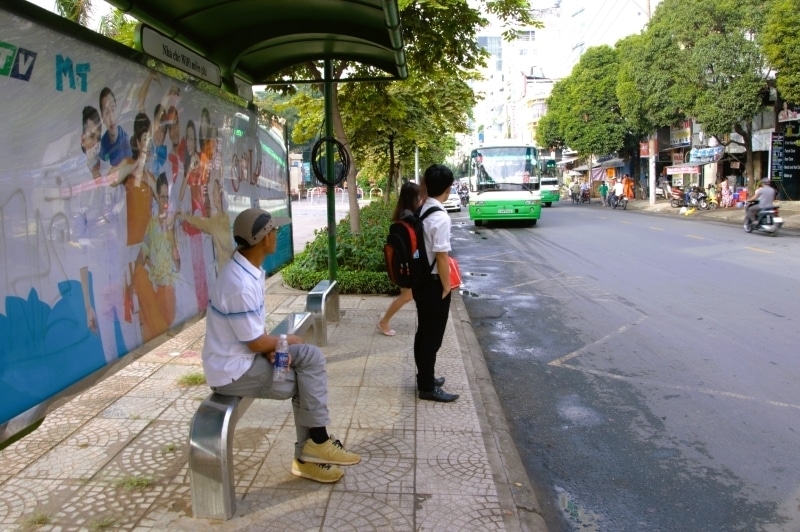
Other Pathways
There are a few other visa categories you might hear about, but they are rarely practical for retirees.
- A work visa with a TRC is only available if you have an active job or a consultancy role with a registered company in Vietnam.
- A student visa is another option, but you would need to enroll in a long-term language program, which isn’t ideal if your main goal is retirement rather than study.
- Permanent residency is also technically possible, but the eligibility rules are very strict and it’s rarely granted to new arrivals, making it an unrealistic choice for most retirees.
Because of this, a majority of retirees in Vietnam just go with a visa run every 90 days.
How About a Golden Visa?
There has been recent news about a 10-year Golden Visa program in Vietnam that is expected to launch sometime in 2025.
At this point, the requirements have not been announced, so no one knows exactly what documents or investment levels will be needed. Many retirees are hopeful that this visa will finally provide a stable, long-term option for living in Vietnam without the hassle of regular visa runs.
We will keep watching for updates and update this article as soon as more details become available.
Can I Get a Visa If I Buy Property in Vietnam?
Unfortunately, buying property in Vietnam does not give you any visa or residency benefits. Even if you purchase a house or apartment, you will still need to maintain a valid visa separately.
Do I Need Health Insurance for a Visa Application?
No, health insurance is not required to apply for a visa in Vietnam. For most visa runs, the process is simple, and in many cases, you only need your passport and passport-sized photos.
That said, having health insurance is still a good idea, even if it’s not a requirement. Medical care in Vietnam is affordable, but serious health issues can quickly become expensive. At the very least, consider getting an affordable plan that includes in-patient coverage only to protect yourself in case of accidents or emergencies.
If you want to explore your options, check out our guide to health insurance in Vietnam to find a plan that suits your needs.
Disclaimer
Visa rules and requirements in Vietnam change frequently, sometimes without much public notice. I do my best to keep this article updated with the latest information, but there may be changes that happen after publication.
For the most up-to-date visa rules, visit the Vietnam Immigration Department (Ministry of Public Security) website.
Please note that the website is in Vietnamese only, but you can use your browser’s automatic translation feature to read it in your preferred language.


